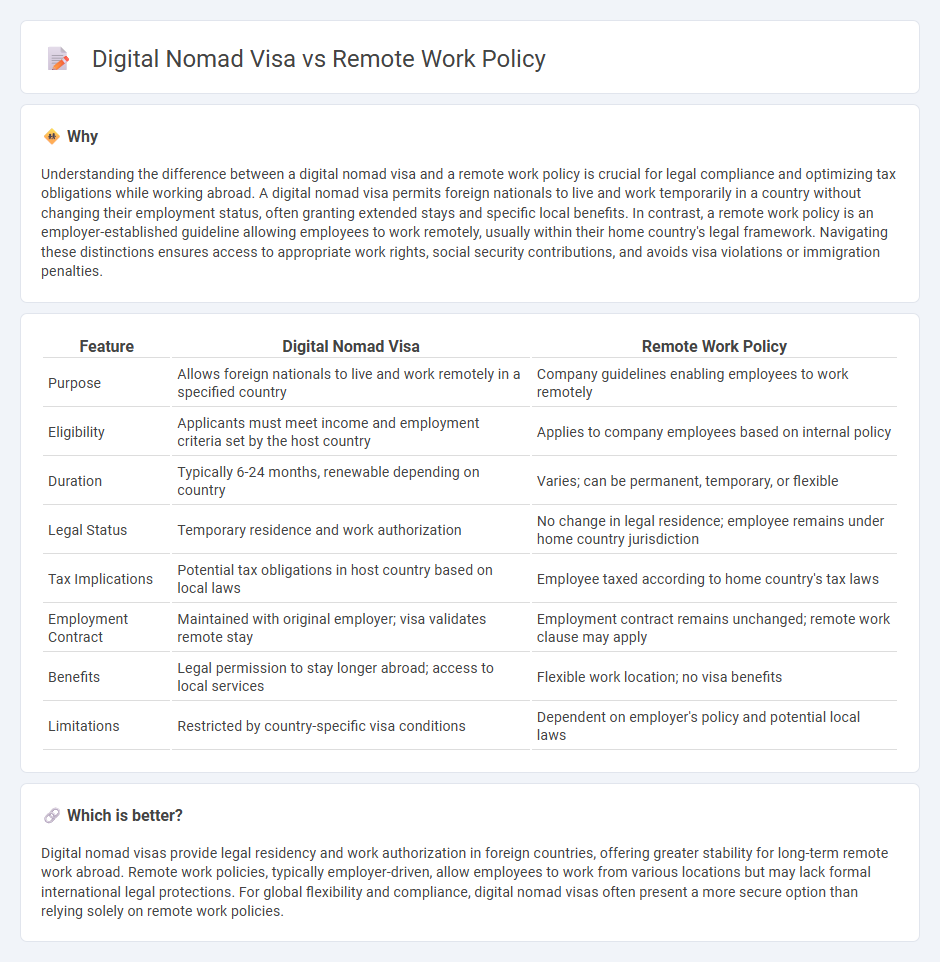
Digital nomad visas provide legal pathways for professionals to live and work in foreign countries temporarily, offering benefits such as tax incentives and easier access to local services. Remote work policies, on the other hand, focus on organizational frameworks that enable employees to work outside traditional office environments without geographic restrictions. Explore how these options shape the future of global employment and work flexibility.
Why it is important
Understanding the difference between a digital nomad visa and a remote work policy is crucial for legal compliance and optimizing tax obligations while working abroad. A digital nomad visa permits foreign nationals to live and work temporarily in a country without changing their employment status, often granting extended stays and specific local benefits. In contrast, a remote work policy is an employer-established guideline allowing employees to work remotely, usually within their home country's legal framework. Navigating these distinctions ensures access to appropriate work rights, social security contributions, and avoids visa violations or immigration penalties.
Comparison Table
| Feature | Digital Nomad Visa | Remote Work Policy |
|---|---|---|
| Purpose | Allows foreign nationals to live and work remotely in a specified country | Company guidelines enabling employees to work remotely |
| Eligibility | Applicants must meet income and employment criteria set by the host country | Applies to company employees based on internal policy |
| Duration | Typically 6-24 months, renewable depending on country | Varies; can be permanent, temporary, or flexible |
| Legal Status | Temporary residence and work authorization | No change in legal residence; employee remains under home country jurisdiction |
| Tax Implications | Potential tax obligations in host country based on local laws | Employee taxed according to home country's tax laws |
| Employment Contract | Maintained with original employer; visa validates remote stay | Employment contract remains unchanged; remote work clause may apply |
| Benefits | Legal permission to stay longer abroad; access to local services | Flexible work location; no visa benefits |
| Limitations | Restricted by country-specific visa conditions | Dependent on employer's policy and potential local laws |
Which is better?
Digital nomad visas provide legal residency and work authorization in foreign countries, offering greater stability for long-term remote work abroad. Remote work policies, typically employer-driven, allow employees to work from various locations but may lack formal international legal protections. For global flexibility and compliance, digital nomad visas often present a more secure option than relying solely on remote work policies.
Connection
Digital nomad visas are designed to attract remote workers by providing legal frameworks that facilitate employment across borders without traditional work permits. Remote work policies complement these visas by establishing clear guidelines for telecommuting, data security, and labor rights, ensuring compliance for both employers and employees. Together, they enable seamless and flexible employment opportunities in a globalized economy.
Key Terms
**Remote Work Policy:**
Remote work policy outlines an organization's framework for employees to work outside the traditional office environment, emphasizing flexibility, productivity, and data security. It typically covers eligibility criteria, work hours, communication protocols, and technology usage to ensure seamless collaboration across locations. Explore how well-defined remote work policies enhance global workforce management and employee satisfaction.
Telecommuting
Remote work policies define company guidelines allowing employees to work from any location, fostering flexibility and productivity in telecommuting environments. Digital nomad visas legally permit professionals to reside temporarily in foreign countries while working remotely, offering a structured approach to international telecommuting. Explore how aligning remote work policies with digital nomad visa regulations can optimize global telecommuting opportunities.
Flexible Hours
Flexible hours within remote work policies empower employees to tailor their schedules, enhancing productivity and work-life balance without geographic constraints. Digital nomad visas primarily facilitate legal residence in foreign countries, offering freedom to work remotely but typically do not regulate or guarantee flexible working hours. Explore the distinctions and optimize your work model by learning more about remote work policies and digital nomad visa options.
Source and External Links
Employee Remote Work Policy Template (Workable) - A remote work policy includes definitions of remote arrangements, guidelines for workspace setup and communication, equipment provisions, and compensation adjustments, serving as a foundation to tailor company-specific policies.
Creating a Successful Remote Work Policy (NordLayer) - A remote work policy outlines conditions, eligibility, work timing, supervisory approvals, and scope of work locations to ensure clarity and compliance for remote staff.
Remote Work Policy (City of Sacramento) - This policy emphasizes employee availability, reporting requirements, professional conduct during online meetings, and maintaining a distraction-free workspace to uphold productivity and accountability.
 dowidth.com
dowidth.com